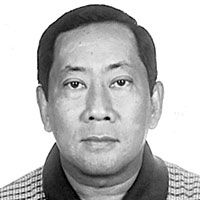Transcentral needs strong metal barriers!

I was hearing mass at the St. John’s Priory in Banawa Hills, when my cellphone buzzed (it was on vibrator mode) at 10:20am. I didn’t answer it but I texted my friend, Boging Palacios of the Star Group who rode their bikes to Balamban last Sunday to just text me. It was a frantic text about the tourist bus accident that happened in Sitio C. Balamban that killed more than 21 people and injured 20 others, the majority of whom were Iranian students. I immediately forwarded his text to my good friend Dr. Pek Eng Lim of ERUF who immediately dispatched their emergency crew to the accident site. But this was obviously not an ordinary bus accident.
I was told where exactly the JD tourist (the bus owner/driver was the lone Filipino fatality) bus fell. It is at the most dangerous section of the Transcentral Highway, the steepest part of the mountain. This area is very close to the entrance of Mt. Manunggal from the Transcentral Highway, the crash site of the late Pres. Ramon Magsaysay, about 4 to 5 kilometers from that accident area.
As of this time, no one from the media reported whether the railings that prevent vehicles from falling down into the cliff were breached or if there were no railings at all. From what I saw in the photographs in our newspapers, I didn’t see any railings or it struck the start of the railing. Since day one when the Transcentral Highway opened to the public we’ve alerted the Department of Public Works and Highways (DPWH) to place those strong metal barriers to prevent what would have been a small accident into a major disaster, like this one. It made the front page headlines not only of the local newspapers, but the national newspapers as well.
Of course, we cannot tell what really was the cause of the accident. This is why we’ve been harping on our Congressmen for the enactment of a law creating the National Transportation Safety Board (NTSB) similar to the one in the United States with the same name that investigates all forms of accidents from airplane crashes, ship sinking or collisions and bus accidents, except for car accidents. In fairness to the tourism industry, this is the first major accident that affected them. I would like to believe that they have better maintenance procedures or expenses than ordinary V-hires.
There have been many accidents that occurred in the Transcentral Highway, mostly by habal-habal motorcycles that often do not report these accidents. So far, this bus accident is on record as the one that took many lives. Our condolences to the Iranian student community that it had to happen at a time that they wanted to take a breather from school.
Being Catholics, many of our friends texted me that the plate number of the bus was GWZ-666, which according to the Bible is the number of the Satan. Allow me to douse cold water into this myth because if it were true, then all those vehicles sporting the number 666 would have already met accidents or worse. What we ought to do is knock on the doors of the DPWH to spend more money on what I would say is the unfinished portion of the Transcentral Highway, as it needs metal nets (Gabions) to hold many of its steep slope to prevent landslides and yes, many more metal barriers.
* * *
Surely everyone knows that ”An ounce of prevention is better than a pound of cure.” If only there was a barrier in place at the Transcentral Highway, the tourist bus accident would have been a mere “incident” that would not be news worthy. But this has been the reality in the Philippines; too often, when we warn people about something, they never heed the warnings.
A case in point is many of those speeding mini-buses that ply the north and south routes in Cebu Province. The only time drivers slow down is when they see an accident, especially one that caused the deaths of passengers. Then everything else is soon forgotten when the news of an accident is no longer featured by the media.
A year ago, a reader pointed out certain defects on the Mandaue-Mactan Bridge, complete with photographs. We wrote the article in our column to alert the authorities, but no one was alarmed by this potential problem. Now it is the turn of Vice Governor Greg Sanchez to sound the alarm that the bridge is unsafe. All of a sudden, the media takes interest in this story. Maybe the Vice Governor was looking for some attention, which is why he is now sounding the alarm that our bridge is unsafe. But hopefully, this should wake up the DPWH to look into this problem and tell us Cebuanos the truth on how safe or unsafe is our old Mandaue Mactan Bridge.
* * *
Email: [email protected]
- Latest
- Trending




























